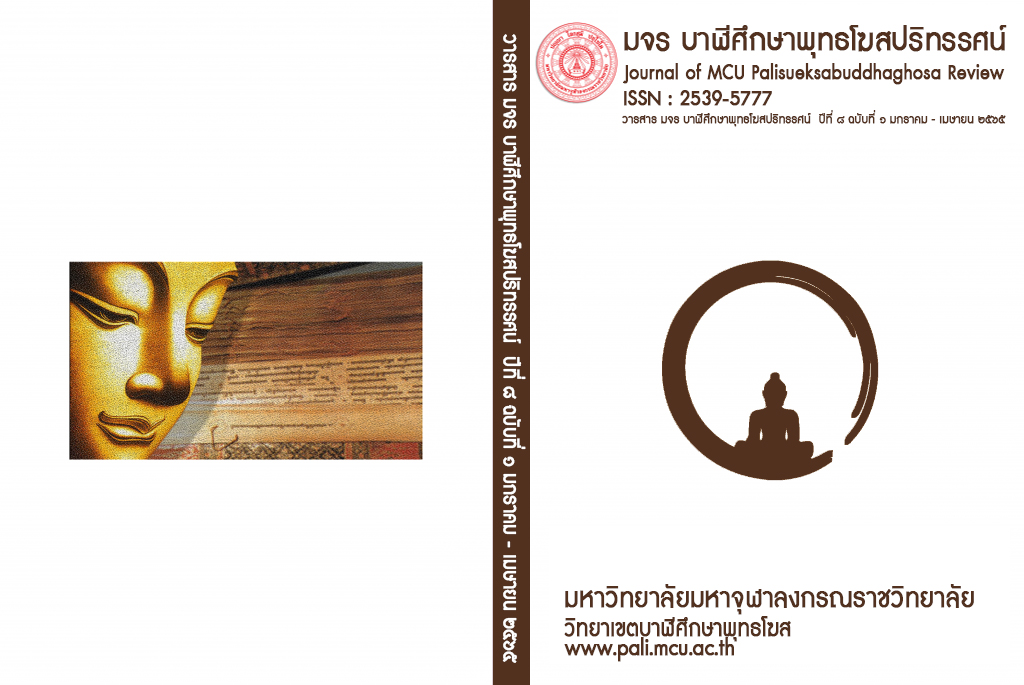แง่มุมเชิงอารมณ์ของนิสัยการให้เหตุผลทางคณิตศาสตร์ของนักเรียนในชั้นเรียนคณิตศาสตร์ที่ใช้การศึกษาชั้นเรียนและวิธีการแบบเปิด
Main Article Content
บทคัดย่อ
บทความวิจัยนี้มีวัตถุประสงค์เพื่อวิเคราะห์แง่มุมเชิงอารมณ์ของนิสัยการให้เหตุผลทางคณิตศาสตร์ของนักเรียนในชั้นเรียนคณิตศาสตร์ที่ใช้การศึกษาชั้นเรียนและวิธีการแบบเปิด กลุ่มเป้าหมาย คือ นักเรียนชั้นประถมศึกษาปีที่ 3 ภาคเรียนที่ 2 ปีการศึกษา 2561 จำนวน 8 คน โรงเรียนบ้านโนนแสนคำหนองศาลาศรีสะอาด อำเภอกันทรลักษ์ จังหวัดศรีสะเกษ ได้รับการคัดเลือกแบบเจาะจง รวบรวมข้อมูลโดยการสัมภาษณ์ การสังเกต การบันทึกภาพและวีดิทัศน์ วิเคราะห์ข้อมูลเชิงคุณภาพด้วยการตรวจสอบสามเส้า ผลการวิจัยพบว่า ตามแนวคิดของ Inprasitha (2011) มีการใช้การศึกษาชั้นเรียนที่ส่งเสริมแง่มุมดังกล่าวโดยการทำงานร่วมกันระหว่างผู้วิจัย ผู้ช่วยวิจัย และครูผู้สอน และการใช้วิธีการแบบเปิดทำให้เห็นนิสัยการให้เหตุผลทั้ง 4 แง่มุม ได้แก่ การวิเคราะห์ปัญหา การนำยุทธวิธีไปใช้ การใช้การเชื่อมโยง และการสะท้อนคิดของวิธีการแก้ปัญหา โดยมีแง่มุมเชิงอารมณ์ที่เกิดขึ้นดังนี้ 1. การนำเสนอปัญหาปลายเปิด นักเรียนมีปัญหาเป็นของตนเองโดยมีอารมณ์ตื่นเต้นที่ได้วิเคราะห์ปัญหา 2. การเรียนรู้ด้วยตัวเองของนักเรียน นักเรียนครุ่นคิดจากการวิเคราะห์ปัญหา ตื่นเต้นที่ได้แนวคิดจากยุทธวิธี ดีใจเมื่อเชื่อมโยงแนวคิดได้ และมั่นใจที่สะท้อนคิดวิธีการแก้ปัญหาได้ด้วยตัวเอง 3. การอภิปรายของนักเรียนทั้งชั้น นักเรียนเปรียบเทียบความเหมือนและความต่างของแนวคิดที่สร้างโอกาสการเรียนรู้ด้วยตัวเองกับเพื่อนๆ มีการครุ่นคิดเมื่อวิเคราะห์ปัญหาหน้าชั้น ตื่นเต้นในยุทธวิธีการแก้ปัญหาทั้งชั้น และดีใจที่สามารถเชื่อมโยงแนวคิดจากเพื่อนได้ และ 4. การสรุปเชื่อมโยงแนวคิดทางคณิตศาสตร์ของนักเรียนที่เกิดขึ้นในชั้นเรียน นักเรียนดีใจที่สามารถสรุปเชื่อมโยงแนวคิดทั้งชั้นเพื่อเป็นวิธีการเรียนรู้ในคาบถัดไป
Article Details

อนุญาตภายใต้เงื่อนไข Creative Commons Attribution-NonCommercial-NoDerivatives 4.0 International License.
เนื้อหาและข้อมูลในบทความที่ลงตีพิมพ์ในวารสาร มจร บาฬีศึกษาพุทธโฆสปริทรรศน์ถือเป็นข้อคิดเห็นและความรับผิดชอบของผู้เขียนบทความโดยตรงซึ่งกองบรรณาธิการวารสาร ไม่จำเป็นต้องเห็นด้วย หรือร่วมรับผิดชอบใด ๆ บทความ ข้อมูล เนื้อหา รูปภาพ ฯลฯ ที่ได้รับการตีพิมพ์ในวารสาร มจร บาฬีศึกษาพุทธโฆสปริทรรศน์ถือเป็นลิขสิทธิ์ของวารสาร มจร บาฬีศึกษาพุทธโฆสปริทรรศน์หากบุคคลหรือหน่วยงานใดต้องการนำทั้งหมดหรือส่วนหนึ่งส่วนใดไปเผยแพร่ต่อหรือเพื่อกระทำการใด ๆ จะต้องได้รับอนุญาตเป็นลายลักอักษรจากวารสาร มจร บาฬีศึกษาพุทธโฆสปริทรรศน์ก่อนเท่านั้น
เอกสารอ้างอิง
Changsri, N. (2012). Teacher’s Perceived Beliefs about Teaching Practices in Teacher Professional Development Based on Lesson Study and Open Approach Context. Doctor of Philosophy Thesis in Mathematics Education, Graduate School, Khon Kaen: Khon Kaen University.
Cuoco, Al, E. Paul Goldenberg, and June Mark. (1996). “Habits of Mind: An Organizing Principle for Mathematics Curriculum.” Journal of Mathematical Behavior: 402-375.
Erwin, J. C. (2004). The classroom of choice: Giving students what they need and getting what you want. Alexandria, VA: Association for Supervision and Curriculum Development.
Foster, F. L. (2012). Using Reasoning Tasks to Develop Skills Necessary to Learn Independently (Doctoral dissertation, Minot State University).
Inprasitha, M. (2006). Open-ended Approach and Teacher Education. Tsukuba Journal of Educational Study in Mathematics, (25), 169-177.
_________. (2010). One Feature of Adaptive Lesson Study in Thailand: Designing a Learning Unit. Journal of Science and Mathematics Education in Southeast Asia, 34(1), 47-66.
_________. (2012). Synthesis Report Format for Academically in School Management by Using Lesson Study and Open Approach. Khon Kaen: Clungnanavitaya LDT.
_________. (2014). Processes of Problem Solving in School Mathematics. Center for Research in Mathematics Education (CRME), Faculty of Education, Khon Kaen University: Pen printing. (In Thai).
_________. (2016). Research and Development of Modern Mathematics Instruction. KKU Research Journal, 2, 2-9.
Inprasitha, N. (2009). Lesson Study: Innovation for Developing Teacher and Students. Thesis for Doctor of Education, Graduate School, Khon Kaen University.
Inprasitha, M. et al. (2003). School Mathematics Learning Reform Emphasized on Mathematical Processes. Khonkaen: Khonkaen Karnpim. (In Thai)
Inprasitha, M., Isoda, M., Wang-Iverson, P., & Yeap, B. H. (Eds.). (2015). Lesson study: challenges in mathematics education. World Scientific.
Kilpatrick, J., Swafford, J., & Findell, B. (2001). Adding It Up: Helping Children Learn Mathematics. Washington, D.C.: National Academy Press.
Lesh, R., & Zawojewski, J. (2007). Problem solving and modeling. In Lester, F. K. (Ed.). Second handbook of research on mathematics teaching and learning, 2, 763-804.
Loipha, S., & Inprasitha, M. (2004). Development of new teaching profession for enhancing mathematical learning. KKU Journal of Mathematics Education, 1 (January-June), 18-28.
Manmai, T. O., Inprasitha, M., Changsri, N., & Pattanajak, A. (2020). Development of reasoning habits through lesson study and open approach teaching practices. International Educational Research, 3(2), p29-p29.
National Council of Teachers of Mathematics [NCTM]. (2009). Focus in high school mathematics: reasoning and sense making. Reston, VA: National Council of Teachers of Mathematics.
Stigler, J. W., & Hiebert, J. (1999). The Teaching Gap: Best Ideas from the world’s Teachers for Improving Education in the Classroom. New York: The Free Press.
Tapsanit, R. (2017). Students’ Analogical Reasoning in Mathematics Classroom Using Lesson Study and Open Approach. Master of Education Thesis in Science and Technology Education, Graduate School, Khon Kaen University.
Wagner, T. (2008). The global achievement gap: Why even our best schools don’t teach the new survival skills our children need – and what we can do about it. New York, Basic Books.
Zhao, Y. (2009). Catching up or leading the way: American education in the age of globalization. Alexandria, VA: Association for Supervision and Curriculum Development.


